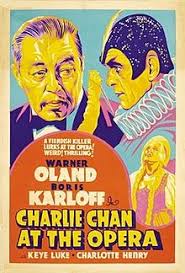
One of the residents at the Rockland State Sanitarium is an amnesiac who spends his time in the music room playing the piano and singing opera. He’s been a resident for seven years and no one knows who he really is. One night he is playing and singing as usual when one of the sanitarium guards brings him the day’s newspaper.
When he sees a picture of a beautiful woman on the front page he suddenly says Lilli. He begins to remember. His name is Gravelle (Boris Karloff). Seven years ago Gravelle was married to Lilli Rochelle (Margaret Irving), a soprano opera singer. He remembers that Lilli and her lover Enrico Barelli (Gregory Gaye) tried to murder him in a fire in 1923. Gravelle overpowers the guard and escapes from the sanitarium. He heads for the San Marco opera house where Lilli is scheduled to sing.
Charlie Chan (Warner Oland) happens to be in San Francisco and is scheduled to return to Honolulu at midnight. Visiting his friend Inspector Regan (Guy Usher) Charlie learns that Lilli has received a threat on her life. Lilli is at the police station looking for police protection. She invites Charlie to see her performance that night. Charlie agrees to be at the theater. Inspector Regan assigns the racist Sergeant Kelly (William Demarest) to help Charlie keep an eye on things.
While Gravelle is roaming around the opera house others are having their own issues with each other. Madame Rochelle’s husband Mr. Whitely (Frank Conroy) and Barelli’s wife Madame Anita Barelli (Nedda Harrigan) are not thrilled with the affair between Lilli and Enrico. When people start dying Charlie’s investigation goes into full swing.
“Charlie Chan at the Opera” was released 1937 and was directed by H. Bruce Humberstone. It is the thirteenth film of the forty-four films in the standard Fox/Monogram Charlie Chan cannon as well as the thirteenth time of sixteen where Warner Olan plays the Charlie Chan character.
The opera performed in the movie is an actual short opera written by Oscar Levant specifically for the film. The opera is called “Carnival”.
What makes this entry in the Charlie Chan cannon a treat is, of course, Boris Karloff. Boris plays the madman suspected of murdering two people. The question is how mad is he. He certainly looks the part, even in that opera getup. But he’s playing the demon Mephisto so it’s understandable. He seems to tower over everyone else in whatever scene he’s in. He does an excellent job of acting, however his fake piano playing is just a bit too fake. Otherwise he steals the movie.
There are disagreements as to whether or not Karloff did his own singing in the film. Some say his voice was dubbed by Tudor Williams and some say it was really Karloff. Karloff really was a baritone. He was definitely lip syncing but was he lip syncing to a recording of his own voice or someone else’s? IMDb has Williams credited as Gravelle’s singing voice on his own page so it seems more likely than not that it is Williams’ voice and not Karloff’s.
Technically this was Karloff's second appearance in a Charlie Chan film. In 1929 he had a small part in the silent Charlie Chan film "Behind That Curtain" with E.L. Park, and actual Asian, playing the ever so small role of Charlie Chan.
Benson Fong appears as an extra in the film. Benson would later play #3 son Tommy Chan in several Charlie Chan films. Keye Luke reprises his role as #1 son Lee Chan.

